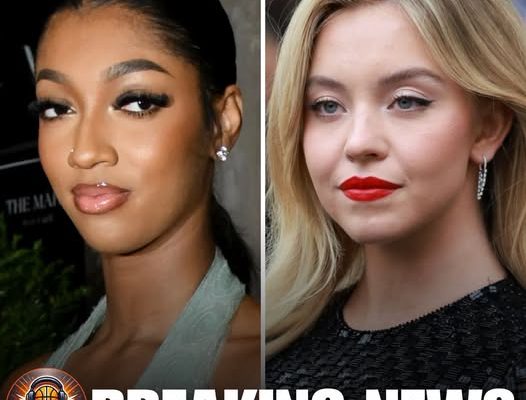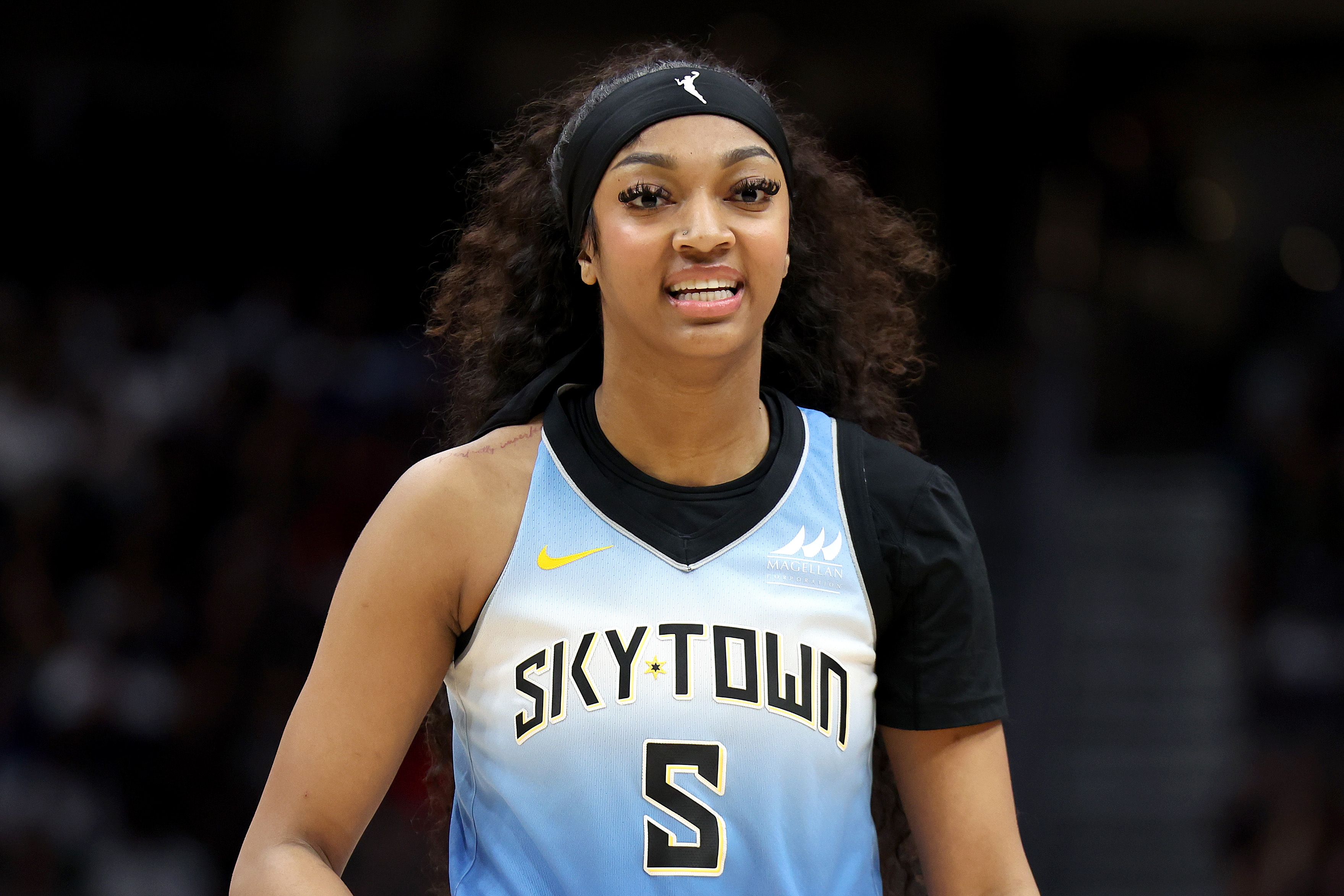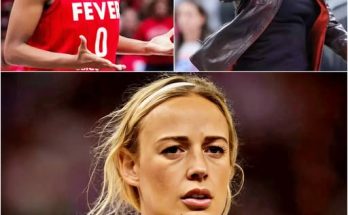WNBA star Angel Reese has called for a MASSIVE boycott of American Eagle, denouncing the brand’s latest ad campaign featuring actress Sydney Sweeney as “disgusting and disrespectful to black culture.”
The sports and fashion worlds are abuzz after WNBA star Angel Reese slammed American Eagle’s latest ad campaign. Reese, a prominent figure in women’s basketball, publicly denounced the campaign, which also stars actress Sydney Sweeney, calling it “disgusting and disrespectful to black culture.” The statement has sparked debates around cultural representation, brand responsibility, and the power of athletes to shape consumer behavior.
Reese’s passionate comments quickly gained traction, resonating with a significant segment of the audience, especially in the black community. The controversy highlights the changing landscape of brand marketing, where authenticity and cultural sensitivity are increasingly important to consumers, especially young people who are sensitive to social issues.
The boycott call, amplified by Reese’s massive following, raises important questions about how brands shape diverse cultural narratives and the potential consequences of perceived wrongdoing. The situation is a prime example of the intersection of sports, celebrity, fashion, and social commentary, highlighting the significant impact public figures can have on brand perception and consumer loyalty.
Angel Reese didn’t hold back. The WNBA star’s strong words came during an Instagram Live, where she directly condemned American Eagle’s new campaign. Reese bluntly declared that Sydney Sweeney’s ad was “disgusting and disrespectful to black culture.” She expressed deep outrage, feeling the brand had missed the mark in a big way.
Her direct condemnation resonated with many. Basketball Doll, as many call her, felt the imagery or message in the American Eagle ad was inappropriate. She linked her outrage to a broader issue of how black culture is often treated in mainstream advertising.
The American Eagle ad campaign at the center of this firestorm of criticism featured actress Sydney Sweeney. The campaign photos show Sweeney posing in a variety of casual outfits, which are a signature style of the brand. The style has a light and youthful feel. One photo shows her wearing a durag.

This particular image, the durag, seems to be the main point of contention. While American Eagle may be aiming for a bold or edgy style, many feel that a non-black person wearing a durag in a fashion ad is culturally insensitive. It can feel like appropriating black culture without really understanding its origins or implications.
Reese’s statement quickly spread like wildfire across social media platforms. Fans, fellow athletes, and celebrities chimed in, sparking a huge wave of discussion. Hashtags like #BoycottAmericanEagle and #AngelReese became trending topics.
Thousands of users posted in support of Reese, empathizing with her feelings of outrage. Many shared their own experiences with brands that mishandled cultural elements. The immediate and widespread response showed the power of a prominent voice like Angel Reese. Her fans were quick to respond.
To get to the core of Reese’s concern, we must understand cultural appropriation. This occurs when elements of one culture are used by members of another, often the dominant, culture without understanding or respecting their original meaning. It strips away the deep roots of a practice, symbol, or style.

Appropriation goes further than that. It involves using cultural elements in a way that benefits the user while the original creators see no benefit. Think of major fashion brands selling designs that are clearly inspired by indigenous art without crediting the source or making proper payments. When a brand uses a durag in a fashion ad, they may feel that cultural elements are being used in a disrespectful way.
This is not the first time a brand has faced backlash for its depiction of black culture. History is full of examples of companies that have stumbled. Remember when some beauty brands used blackface or cartoon stereotypes in their advertising
Recently, many brands have been criticized for selling items that resemble offensive historical artifacts. Other fashion companies have been accused of using hairstyles or clothing styles of black people without credit or using black models. These past mistakes create a stereotype. They make people more aware and sensitive to future stereotypes.
The Importance of Representation in Fashion and Media
Why is it so important to see diverse faces in advertising? Because accurate and positive representation builds self-esteem. For minorities, seeing themselves authentically reflected in fashion and media affirms their worth. It shows that their culture is seen and respected.
When images are stereotypical, or worse, dismissive, it can be harmful. It can reinforce negative ideas and make people feel left out. Brands have a huge opportunity to show the world as it really is, with its many cultures and people. They should aim to show people in a way that is authentic and beautiful.
Angel Reese is more than just a talented basketball player. She is a cultural icon, especially among young people and the black community. Her accomplishments on the court, including winning a national championship, have made her a household name. Her active social media presence has helped her reach even more people.
With millions of followers across multiple platforms, Reese’s voice carries significant weight. When she speaks, people listen. Her candor and authenticity make her a powerful voice in shaping public opinion. She shows how athletes now have power beyond the playing field.
Consumer boycotts are nothing new, and many have forced major companies to change. Think of the Nike boycott in the 1990s over labor issues. Or Adidas facing pressure over human rights issues. These moments show that the collective power of consumers can make a difference.
In fashion, some brands have changed their advertising campaigns or product lines after public outcry. When enough people stop buying or voice their discontent, brands often pay attention. Boycotts prove that consumers, especially when led by strong voices, can shape what companies do.
If the Angel Reese American Eagle boycott becomes serious, it could have a serious impact on the brand. Boycotts can have a quick impact on sales. A drop in sales will directly impact a company’s bottom line. But the damage goes beyond sales.
A boycott can seriously damage a brand’s reputation. This can lead to a loss of new customers and even drive existing customers to competitors. A bad reputation can also cause a drop in stock prices, which hurts investors. For any retail brand, trust and a good image are key to success. Losing that can be a big deal.
Strategies for Brands to Navigate Cultural Controversies
When a brand finds itself in a cultural storm, acting quickly and honestly is key. First, a sincere apology can go a long way in helping to show that the brand is listening. Next, brands should be clear about what they are doing to fix the problem.
Consumers today want authenticity from brands. They are fed up with marketing campaigns that are fake or just about selling. There is a huge push for brands to stand up for their authentic values. People want companies that truly care about diversity and inclusion.
Athletes like Angel Reese are changing the game. They use their large platforms to speak out on social issues. This makes them powerful brand advocates. They can influence people’s thinking and their purchasing decisions.
This is very different from the old ways of advertising. In the past, brands largely controlled their messaging. Now, influencers and athletes can make or break a campaign with a single post. Their reach is often deeper and more authentic than traditional advertising. Brands need to embrace this power.
The call to boycott Angel Reese is a clear sign. Brands need to change their marketing strategies. They need to keep up with current values. And most importantly, they need to listen to what diverse consumers are saying. Ignoring the feedback could be a big mistake.
Angel Reese’s call to boycott American Eagle highlights a critical moment for brands. Her concern that Sydney Sweeney’s ad was “disgusting and disrespectful to black culture” points to deeper issues of representation. This shows how powerful an athlete’s voice is in shaping public opinion. Brands must understand their responsibility to be culturally sensitive in all their marketing.



